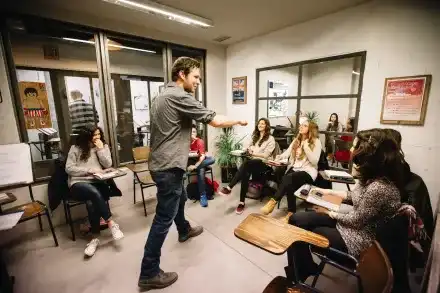PRESENT PERFECT SIMPLE
¿QUÉ ES EL PRESENT PERFECT?
El present perfect es el tiempo verbal que utilizamos para describir acciones que no están acabadas, es decir, las que empezaron en el pasado y continúan hasta el presente.
¿CÓMO LO FORMAMOS?
El present perfect simple se forma con el verbo auxiliar to have y el past participle del verbo principal.
LOOK! 👀
Frases afirmativas:
SUBJECT + HAS/HAVE + PAST PARTICIPLE
Ejemplos:
“I have played football”
“She has been on holiday”
“They have eaten already”
“We have started the movie”
¡PISTA! Seguro que has estudiado los verbos en inglés en algún momento, pues el past participle es el de la tercera columna.
Frases negativas:
SUBJECT + HASN’T/HAVEN’T + PAST PARTICIPLE
¡RECORDATORIO! Hasn’t and Haven’t son contracciones. En su forma más larga son has not and have not.
Ejemplos:
“I haven’t watched TV today”
“He hasn’t finished his homework”
“They haven’t sold the house”
“We haven’t bought tickets for the match”
Preguntas:
HAVE/HAS + SUBJECT + PAST PARTICIPLE
Ejemplos:
“Have you talked to your mum?”
“Has she walked home?”
“Have they left the party?”
¡IMPORTANTE! El past participle siempre se queda igual y no se conjuga, pero el verbo auxiliar have sí que se conjuga dependiendo de si es 1ª/2ª/3ª persona y singular/plural. Be careful!
¿CUÁNDO PODEMOS UTILIZAR EL PRESENT PERFECT SIMPLE EN INGLÉS?
A continuación, vamos a ver los casos en los que podemos utilizar el present perfect. LET’S TAKE A LOOK!
- CUANDO HABLAMOS DE UNA EXPERIENCIA EN NUESTRA VIDA YA SEA NEGATIVA O POSITIVA
Ejemplos:
“I have lived in Spain for 17 years”.
“We have never lived in the USA.”
“They have always played football.”
“You have never been to France.”
- CUANDO INDICAMOS UN CAMBIO EN EL TIEMPO
Ejemplos:
“I have learned to be more economical.”
“He has improved his social skills.”
“They have become good parents.”
- CUANDO HABLAMOS DE ACCIONES QUE NO SE HAN PRODUCIDO TODAVÍA
Ejemplos:
“I haven’t arrived in Spain.”
“We haven’t finished our dinner”
- CUANDO HABLAMOS DE LOGROS
Ejemplos:
“I have won many swimming medals.”
“She has finished her degree.”
“They have played 500 matches in first división.”
- CUANDO HABLAMOS DE ACCIONES PASADAS QUE PUEDEN VOLVER A SUCEDER
Ejemplos:
“I have visited New York twice, so I need to go back.”
“We have argued lots and still don’t agree with each other.”
“She has taken the test 3 times and she still thinks she’ll fail.”
Cuando no utilizar el present perfect:
El present perfect es para acciones en el pasado sin especificación del tiempo. Podemos utilizar diferentes adverbios de tiempo no concretos: since, yet, already, for, just...
Ejemplos:
“I have been to work on Monday” INCORRECT
“He has played football yesterday” INCORRECT
“The World Cup hasn’t started yet.” CORRECT
¿Hemos resuelto vuestras dudas? Podéis consultar este post todas las veces que lo necesitéis.
Ven a visitar nuestra academia de inglés en Valencia. ¡Te esperamos! 😀
Pronunciación avanzada: entrena acento británico y americano online
Técnicas y herramientas para mejorar tu pronunciación en inglés (británico y americano) con feedback automático y ejercicios prácticos.
Clases híbridas de inglés: cómo combinar presencial y online de forma óptima
En los últimos años, la enseñanza de idiomas ha avanzado de manera acelerada. Entre las metodologías más efectivas nos encontramos el modelo híbrido, una combinación de clases presenciales y online que potencia el aprendizaje.
Por qué ya no se canta God Save the Queen: historia reciente del himno
Descubre el cambio de letra del himno británico tras la muerte de la Reina y datos curiosos sobre su historia.




